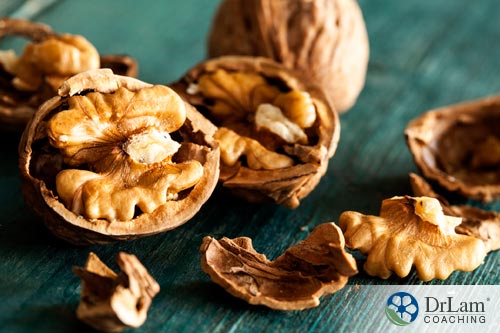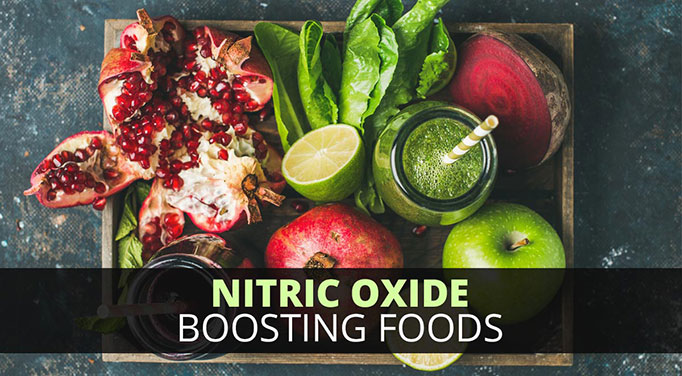Although your body naturally generates nitric oxide, as you age the amount your body is capable of producing decreases greatly. Without intaking a sufficient amount of food, your health, physically and mentally, can begin to deteriorate in different ways. You should NOT accept processed junk food loaded with artificial synthetic food dyes, hydrogenated oils, refined sugars, and toxic preservatives as sources of nourishment for your body. In fact, heavily processed food, or fast-food items, will not nurture and improve your health. If anything, they will put you on tracks for an unhealthy lifestyle. When your diet, lifestyle habits, and lack of exercise prolong, you build a foundation for a decrease in essential molecules in your body, such as nitric oxide. Thus, you pave the path for erectile dysfunction, cardiovascular conditions, hypertension, cognitive decline, and AFS.
 While nitric oxide is naturally generated in your body, keep in mind that as you age, the percentage decreases rather rapidly. You don’t naturally have a nitrate reduction gene, but in fact, it depends on your oral bacterial levels. There have been remarkable performed studies that have found a direct link between reducing oral bacteria and systemic blood pressure levels. If you eradicate all oral bacteria, your blood pressure increases. Your bacteria, which outnumber all of your cells, perform functions that are jaw-dropping. Some of these oral bacteria communities amazingly provide your body with nitrite and nitric oxide, naturally. They improve your absorption of nitric oxide from the dietary sources as well. Other studies have found that if you eradicate all oral bacteria, you can correlate between certain bacteria and normal blood pressure levels. There is specific colonization of certain bacteria that directly impact your hypertension levels, and is remarkable. If you use oral antiseptics to reduce or prevent bad breath, you may be destroying more than just your bad breath! The reduction and elimination of these oral bacterial species can increase your risk of cardiovascular health conditions and high blood pressure levels as well. Also, lack of oral bacteria leads to less saliva production and directly affects your nitric oxide production levels. Taking too many rounds of antibiotics, having poor oral hygiene habits, or the overuse of antiseptic mouthwash or toothpaste all reduce your generation of nitric oxide as well. Thus, preserving these oral bacteria communities can lead to homeostasis of your nitric oxide levels. Moreover, having low stomach acid, and the use of stomach acid inhibitor medications, directly suppresses the production of nitric acid. It multiplies your risk of developing cardiovascular health conditions, which is a leading cause of death. Having a healthy diet that is loaded with whole foods, such as fresh fruits and vegetables, high-quality proteins, healthy fats, nuts, and seeds, can all enhance your health and internal functions overall.
While nitric oxide is naturally generated in your body, keep in mind that as you age, the percentage decreases rather rapidly. You don’t naturally have a nitrate reduction gene, but in fact, it depends on your oral bacterial levels. There have been remarkable performed studies that have found a direct link between reducing oral bacteria and systemic blood pressure levels. If you eradicate all oral bacteria, your blood pressure increases. Your bacteria, which outnumber all of your cells, perform functions that are jaw-dropping. Some of these oral bacteria communities amazingly provide your body with nitrite and nitric oxide, naturally. They improve your absorption of nitric oxide from the dietary sources as well. Other studies have found that if you eradicate all oral bacteria, you can correlate between certain bacteria and normal blood pressure levels. There is specific colonization of certain bacteria that directly impact your hypertension levels, and is remarkable. If you use oral antiseptics to reduce or prevent bad breath, you may be destroying more than just your bad breath! The reduction and elimination of these oral bacterial species can increase your risk of cardiovascular health conditions and high blood pressure levels as well. Also, lack of oral bacteria leads to less saliva production and directly affects your nitric oxide production levels. Taking too many rounds of antibiotics, having poor oral hygiene habits, or the overuse of antiseptic mouthwash or toothpaste all reduce your generation of nitric oxide as well. Thus, preserving these oral bacteria communities can lead to homeostasis of your nitric oxide levels. Moreover, having low stomach acid, and the use of stomach acid inhibitor medications, directly suppresses the production of nitric acid. It multiplies your risk of developing cardiovascular health conditions, which is a leading cause of death. Having a healthy diet that is loaded with whole foods, such as fresh fruits and vegetables, high-quality proteins, healthy fats, nuts, and seeds, can all enhance your health and internal functions overall.
 In order to protect your bodily regulation of nitric oxide, observe your diet and make changes if necessary. After all, your mother has always been right: eat more dark leafy green vegetables. It’s crucial that you consume an abundance of green leafy vegetables such as kale, spinach, Swiss chard, turnip greens, dandelion, mustard greens, or arugula. These green leafy vegetables are all loaded with dietary nitrite, which is thus converted to nitric oxide and improves your regulation and signaling of this molecule.
In order to protect your bodily regulation of nitric oxide, observe your diet and make changes if necessary. After all, your mother has always been right: eat more dark leafy green vegetables. It’s crucial that you consume an abundance of green leafy vegetables such as kale, spinach, Swiss chard, turnip greens, dandelion, mustard greens, or arugula. These green leafy vegetables are all loaded with dietary nitrite, which is thus converted to nitric oxide and improves your regulation and signaling of this molecule.
Additionally, drinking more beetroot juice could improve your physical health and energy levels. Beetroot juice and beets have been linked to decreasing hypertension and lowering blood pressure levels. Many athletes drink liters of beetroot juice while training for their games and competitions, as it has been also linked to improving exercise performance levels rather incredibly. Beetroot juice effects mitochondrial ATP production, and enhances the tolerance you can have to vigorous physical activity. It’s crucial to mention, that with the spread of the incredible benefits beetroot has on your health, many companies now stamp beetroot extract on their labels. However, not all of these products, in fact, contain nitric oxide, and thus will not give you the same remarkable effects on your health. Not all vegetables or beets are created equally. Essentially, the time of harvest, the growth conditions, amount of sunlight, packaging and heating process all impact the nutrient value. Also, liquid products will de-stabilize nitric oxide, thus consuming more is not always better for you. if you decide to take beetroot supplements but don’t have oral nitrate-reducing bacteria you will not see the best results. These products might dilate your blood vessels, but choosing a high-quality product will only bring about better results.
 Citrus fruits, such as oranges, grapefruit, lemons, and limes, are quite high in vitamin C, which has been directly linked to protecting your nitric oxide molecules from being damaged. Vitamin C, along with proline and lysine, also leads to endothelial wall stability.
Citrus fruits, such as oranges, grapefruit, lemons, and limes, are quite high in vitamin C, which has been directly linked to protecting your nitric oxide molecules from being damaged. Vitamin C, along with proline and lysine, also leads to endothelial wall stability.
Additionally, consuming adequate amounts of vitamin C improves the ability for nitric oxide synthases, which is the enzyme that thus converts the amino acids L-arginine into nitric oxide. Pomegranate is another food incredibly great for enhancing the generation of nitric oxide in your body and improving your sexual function as well. Not only is pomegranate anti-inflammatory, but it reduces oxidative stress, a leading cause of cardiovascular health conditions, in your system. Just like citrus fruit, pomegranate can aid your body in converting nitrite from food into nitric oxide.
 You might assume that walnuts are merely good for your brain and memory, but in fact, they too, have been linked to remarkably healthy nitric oxide levels. Walnuts are high in omega-3 fatty acids, protein, and vitamin E. Vitamin E is especially crucial for the condition of your heart. Moreover, walnuts are high in L-arginine, the amino acids responsible for keeping your blood vessels dilated and relaxed. This improves the blood flow in your body, and the transportation of oxygen as well.
You might assume that walnuts are merely good for your brain and memory, but in fact, they too, have been linked to remarkably healthy nitric oxide levels. Walnuts are high in omega-3 fatty acids, protein, and vitamin E. Vitamin E is especially crucial for the condition of your heart. Moreover, walnuts are high in L-arginine, the amino acids responsible for keeping your blood vessels dilated and relaxed. This improves the blood flow in your body, and the transportation of oxygen as well.
If you are looking to not only improve your nitric oxide to protect your health from various health conditions but also improve your sexual performance, you may just want to add watermelon to your diet more. Watermelon is very high in the amino acid, L-citrulline, which is responsible for getting converted into the amino acid L-arginine. L-arginine is thus converted into nitric oxide and keeps your body functioning in various ways. While the red flesh of the watermelon might be the most beloved to your taste buds, the rind astonishingly contains the highest levels of l-citrulline. Unfortunately, watermelon is very high in sugar so care must be taken to avoid overconsumption.
Consuming an adequate amount of healthy fish, such as omega-3 bursting wild-caught salmon, liver, organ meats, or grass-fed lamb or beef, could improve your nitric oxide levels as well. Both wild-caught seafood and grass-fed livestock are high in CoQ10, which is an absolutely necessary factor in increasing your generation of nitric oxide.
In AFS recovery, we recommend eating organic as much as possible. And we also caution the overuse of certain fruits and vegetables, due to some of the more common mineral imbalances that come with AFS, such as the sodium-potassium balance.
Also, in advanced stages of AFS, your digestion may be compromised, and so eating a lot of raw vegetables may actually worsen certain symptoms. This is why it is really not about jumping on a specific trend, but more about finding the right plan for your unique situation.
Another important factor is that some people are lacking in the needed oral bacteria – possibly due to the overuse of mouthwash - that converts nitrate to nitrite, and some people have a lower amount of stomach acid – especially those who have been on proton pump inhibitors (PPIs) – which makes converting nitrite to nitric oxide quite difficult. That’s why those who’ve been on PPIs for over five years have a 30% increase in heart attack and stroke incidents.
As already mentioned, decreased blood flow is a common denominator in almost all diseases and health issues, and this includes adrenal fatigue. Although the exact role nitric oxide plays in the regulation of adrenocortical function is not yet clear, some studies were done on animals and animal fetuses show a significant effect on cortisol levels from exposure to hypoxemia.
And this makes a lot of sense. If your body is not getting enough oxygen, whether due to asthma or low levels of NO, this is considered a big stressor, and the adrenal glands will try to neutralize this stress by releasing more cortisol. But what happens if this issue is recurrent or chronic, as could happen with consistently low levels of NO?
Chronic stress is the main cause of AFS. In the beginning stages of AFS, the adrenals work overtime to produce more and more cortisol, but after being overworked for a period of time, they are exhausted and their cortisol levels drop, leaving the rest of the NEM stress response to compensate for the loss of the body’s most important anti-stress hormone.
Symptoms of AFS include fatigue, difficulty falling asleep, waking up in the middle of the night, difficulty getting out of bed in the morning, hypoglycemia, food and drug sensitivities, low energy throughout the day, weight gain, difficulty losing weight, anxiety, mild depression, heart palpitations, food cravings, PMS, low libido, infertility, and a host of other hormonal and metabolic issues.
As the condition progresses, the other components of the NEM – whether it’s the hormonal, metabolic, cardionomic, neuroaffect, inflammation, or detoxification response – can also begin to dysregulate. And without a fully functioning stress response, your body is exposed to a lot of oxidative damage from the continuous stress.
Then you get specific effects on the NEM. For example, we already covered how NO deficiency increases the risk for different cardiovascular events, including myocardial infarctions and stroke. But a step before that is the added pressure on the NEM’s cardionomic response.
Part of the stress response is to ready the heart, lungs, and blood vessels to pump more oxygenated blood around the body than usual in order to prepare you for a “fight or flight” response. This is your survival mechanism, and it is triggered by the release of adrenaline and norepinephrine. These hormones are released and modulated by the adrenal glands, and regulated by the sympathetic nervous system.
But if the adrenals are dysregulated, and there is a disruption in the cardionomic response due to the relentlessness of the stress, you can experience symptoms such as heart palpitations, shortness of breath, cardiac arrhythmia, dizziness, and high blood pressure. In more advanced disruptions, you can get POTS-like symptoms and atrial fibrillation.
Over-activity in the cardionomic response puts your metabolism on overdrive without letting your system take a “rest and repair” break, and the constantly switched on “fight or flight” mode can lead to damage in the cardiovascular system. Add to that the increased risk of NO deficiency and your health is on the line. But there’s more: NO deficiency is closely linked to inflammation, another common denominator for chronic health problems, including adrenal fatigue.
NO is a very simple molecule, and in fact, it’s actually a free radical. But due to the polarity of its bond, instead of destabilizing other molecules, it acts as an electron donor, making it a wonderful antioxidant that actually scavenges and neutralizes other free radicals.
But if your body is not making enough NO, you’re lacking in this important antioxidant, and the adverse effects of insufficiency add a lot of stress to your system. And this is especially the case with inflammation. NO plays a key role in the development of inflammation, and in normal physiological conditions, it has a strong anti-inflammatory effect.
Interestingly enough, both underproduction and overproduction of NO can induce inflammation in abnormal circumstances.
 An overproduction of NO can create a pro-inflammatory environment, and it is involved in the immune system response through cytokine-activated macrophages. These macrophages release a high concentration of NO into the system, and this can induce inflammatory disorders in the lungs, gut, and joints. Because of this, there are treatments that use NO inhibitors to counteract the pathogenesis of inflammation.
An overproduction of NO can create a pro-inflammatory environment, and it is involved in the immune system response through cytokine-activated macrophages. These macrophages release a high concentration of NO into the system, and this can induce inflammatory disorders in the lungs, gut, and joints. Because of this, there are treatments that use NO inhibitors to counteract the pathogenesis of inflammation.
On the other hand, impaired production of NO can create a state of vasoconstriction, inflammation, hypoxia, and tissue damage. This link is further supported by the fact that well-vascularized tissues are proven to be more resistant to infections and are able to localize and contain offending agents, such as pathogens and toxins. Poorly vascularized tissues are, by contrast, less efficient in responding to inflammatory stimuli.
And as we’ve already seen, inflammation in the arteries is one of the risk factors for heart disease, and it is associated with age-related NO decline. Another link lies in the bacteria found in the gastrointestinal system. For example, the lack of certain strains in the oral cavity is responsible for a reduced ability to convert ingested nitrate into nitrite.
That’s because nitrate is inert in human beings, it has to be reduced to nitrite by commensal bacteria, and then into NO by stomach acid. This is why, in one study, participants who used antiseptic mouthwash for one week had elevated blood pressure.
This means that the microbiome, once again, is central to health. And ensuring the balance of bacteria in the GI tract and gut is one of the pillars of health. We highly advise against the overuse of mouthwash, though we do recommend tongue scraping as a healthier alternative. Good oral hygiene is important, not just for the teeth and gums, but for the entire system.
And finally, we cannot leave the effects of stress out of this equation. Stress can induce inflammation and both of them together can speed up aging by adding onto the different factors that are involved, including telomeric shortening, oxidative stress, and even oncogene activation. Oncogenes have the capacity to cause cancer when they are activated.
© Copyright 2018 Michael Lam, M.D. All Rights Reserved.

